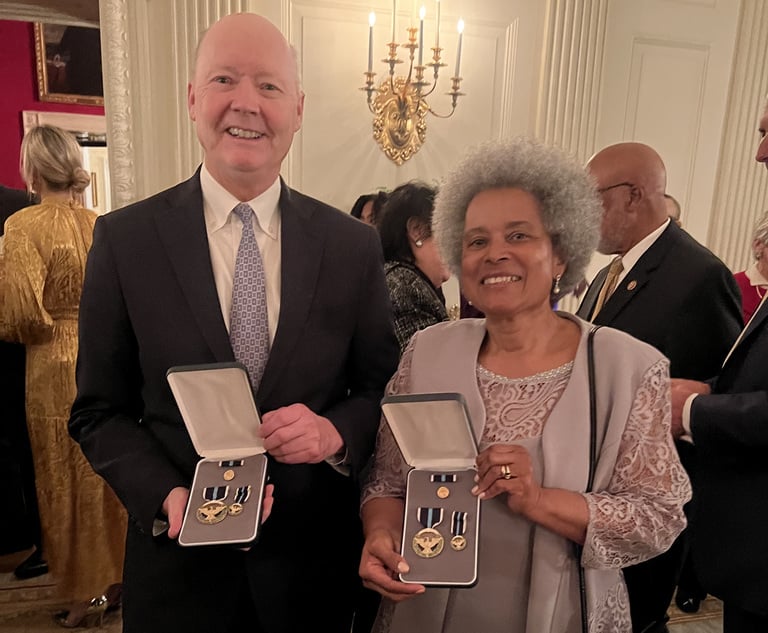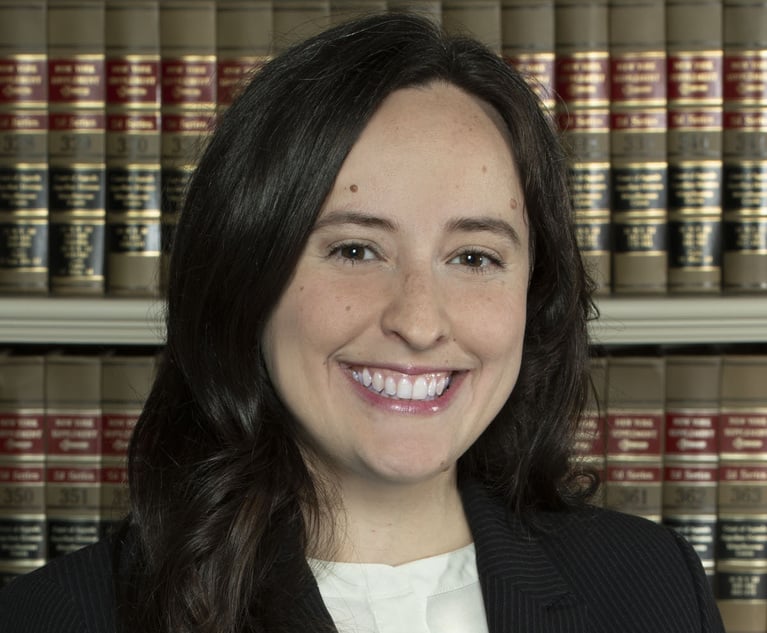Bouchard Orders American Apparel Founder to Repay $19.5M Loan
Former American Apparel CEO Dov Charney could have to pay up to $19.5 million that he owes to a hedge fund from a fight to regain control of the company he helped to found, Delaware's Court of Chancery has ruled.
December 20, 2017 at 04:36 PM
4 minute read
 Dov Charney, the founder and former CEO of American Apparel. Photo Credit: Dov Charney/Flickr
Dov Charney, the founder and former CEO of American Apparel. Photo Credit: Dov Charney/Flickr
Former American Apparel CEO Dov Charney could have to pay up to $19.5 million that he owes to a hedge fund from a fight to regain control of the company he helped to found, Delaware's Court of Chancery has ruled.
Chancellor Andre G. Bouchard on Tuesday upheld as valid a series of agreements Charney struck with Standard General shortly after his ouster over accusations of sexual harassment and mismanagement in 2014, rejecting Charney's claims that the New York-based investment firm had duped him with promises it never intended to keep.
In a 65-page memorandum opinion, Bouchard slammed Charney's “kitchen sink” of defenses to Standard General's suit as “illogical” and agreed that Charney had violated the agreements by challenging their terms in California state court.
“I conclude that Charney could not have reasonably relied on any of these alleged false promises because they directly conflict with the terms of the eight written agreements he signed, and that his other affirmative defenses fail as a matter of law and undisputed fact,” Bouchard said in granting standard general judgment on the pleadings.
The ruling has now cleared the way for Standard General to recover a principal of $19.5 million, plus interest, on the loan that it made to Charney to help fund what turned out to be an unsuccessful proxy battle to retake his grip on American Apparel, which has since gone through two bankruptcies.
According to court documents, Charney borrowed the money in order to increase his holdings in the company to 43 percent so that he could launch a proxy contest to replace the board that had suspended him in the wake of the allegations. Charney denies any wrongdoing and maintains that the accusations against him were fabricated.
After the company pushed back, however, Charney, Standard General and American Apparel entered a standstill agreement that reconstituted the board and established a committee to investigate misconduct allegations and decide whether Charney should return to the board. Separately, Charney and Standard General signed a string of agreements to define their relationship over the months that followed.
The committee in December 2014 voted against reinstating Charney, and the new American Apparel board terminated his employment for cause, sparking a flurry of litigation in multiple forums.
Charney sued in California, asserting that the agreements he had entered with Standard General were invalid and unenforceable, and Standard General responded with its own litigation in Delaware, asking the court to uphold the contracts and award damages under the loan it made to Charney.
In Delaware, Charney raised a slew of 11 affirmative defenses to Standard General's suit, arguing among other things that Standard General had fraudulently induced him with promises that he would return as CEO.
Bouchard, however, said that Charney's claims contradicted the plain terms of the agreements, which laid out a committee process to consider Charney's potential return and established limitations on the parties' voting power in light of the standstill agreement.
“Given the express language of these provisions, Charney could not have reasonably relied on any alleged representation that Standard General would be able to control the investigation and guarantee his return as CEO,” Bouchard said. “To the contrary, that determination would be made by the members of the suitability committee who were obligated to comply with their fiduciary duties as directors of a Delaware corporation.”
And by first filing suit in California, Bouchard said, Charney had breached Delaware exclusive forum provisions in the standstill and other contracts he had entered with American Apparel to avoid the proxy fight. Those breaches, in turn, triggered an event of default, making repayment on the principal and accrued interest payable immediately, more than two years ahead of the contractual due date.
“Standard General emphasizes (and I agree) that these breaches are not just technical because Standard General needlessly has been put through the burden and expense of litigating claims in California that Charney unequivocally agreed to litigate only in Delaware,” Bouchard said.
An attorney for Charney declined to comment, and an attorney for Standard General was not immediately available to comment on Wednesday.
Standard General was represented by Shannon Rose Selden, Derek Wikstrom and Justin Horton of Debevoise & Plimpton and Raymond J. DiCamillo and Matthew D. Perri of Richards, Layton & Finger.
Charney was represented by Mark M. Billion of Billion Law in Wilmington.
The case is captioned Standard General v. Charney.
This content has been archived. It is available through our partners, LexisNexis® and Bloomberg Law.
To view this content, please continue to their sites.
Not a Lexis Subscriber?
Subscribe Now
Not a Bloomberg Law Subscriber?
Subscribe Now
NOT FOR REPRINT
© 2025 ALM Global, LLC, All Rights Reserved. Request academic re-use from www.copyright.com. All other uses, submit a request to [email protected]. For more information visit Asset & Logo Licensing.
You Might Like
View All
Delaware Legal Figures Who Played Key Roles in Ending School Segregation Honored With Presidential Citizens Medal
3 minute read


Chancery Claims Linking Fox Management to Defamation Liability Clear Hurdle
4 minute readTrending Stories
- 1The Importance of Contractual Language in Analyzing Post-Closing Earnout Disputes
- 2People in the News—Jan. 8, 2025—Stevens & Lee, Ogletree Deakins
- 3How I Made Partner: 'Avoid Getting Stuck in a Moment,' Says Federico Cuadra Del Carmen of Baker McKenzie
- 4Legal Departments Dinged for Acquiescing to Rate Hikes That 'Defy Gravity'
- 5Spalding Jurors Return $12M Verdict Against State Farm Insurance Client
Who Got The Work
Michael G. Bongiorno, Andrew Scott Dulberg and Elizabeth E. Driscoll from Wilmer Cutler Pickering Hale and Dorr have stepped in to represent Symbotic Inc., an A.I.-enabled technology platform that focuses on increasing supply chain efficiency, and other defendants in a pending shareholder derivative lawsuit. The case, filed Oct. 2 in Massachusetts District Court by the Brown Law Firm on behalf of Stephen Austen, accuses certain officers and directors of misleading investors in regard to Symbotic's potential for margin growth by failing to disclose that the company was not equipped to timely deploy its systems or manage expenses through project delays. The case, assigned to U.S. District Judge Nathaniel M. Gorton, is 1:24-cv-12522, Austen v. Cohen et al.
Who Got The Work
Edmund Polubinski and Marie Killmond of Davis Polk & Wardwell have entered appearances for data platform software development company MongoDB and other defendants in a pending shareholder derivative lawsuit. The action, filed Oct. 7 in New York Southern District Court by the Brown Law Firm, accuses the company's directors and/or officers of falsely expressing confidence in the company’s restructuring of its sales incentive plan and downplaying the severity of decreases in its upfront commitments. The case is 1:24-cv-07594, Roy v. Ittycheria et al.
Who Got The Work
Amy O. Bruchs and Kurt F. Ellison of Michael Best & Friedrich have entered appearances for Epic Systems Corp. in a pending employment discrimination lawsuit. The suit was filed Sept. 7 in Wisconsin Western District Court by Levine Eisberner LLC and Siri & Glimstad on behalf of a project manager who claims that he was wrongfully terminated after applying for a religious exemption to the defendant's COVID-19 vaccine mandate. The case, assigned to U.S. Magistrate Judge Anita Marie Boor, is 3:24-cv-00630, Secker, Nathan v. Epic Systems Corporation.
Who Got The Work
David X. Sullivan, Thomas J. Finn and Gregory A. Hall from McCarter & English have entered appearances for Sunrun Installation Services in a pending civil rights lawsuit. The complaint was filed Sept. 4 in Connecticut District Court by attorney Robert M. Berke on behalf of former employee George Edward Steins, who was arrested and charged with employing an unregistered home improvement salesperson. The complaint alleges that had Sunrun informed the Connecticut Department of Consumer Protection that the plaintiff's employment had ended in 2017 and that he no longer held Sunrun's home improvement contractor license, he would not have been hit with charges, which were dismissed in May 2024. The case, assigned to U.S. District Judge Jeffrey A. Meyer, is 3:24-cv-01423, Steins v. Sunrun, Inc. et al.
Who Got The Work
Greenberg Traurig shareholder Joshua L. Raskin has entered an appearance for boohoo.com UK Ltd. in a pending patent infringement lawsuit. The suit, filed Sept. 3 in Texas Eastern District Court by Rozier Hardt McDonough on behalf of Alto Dynamics, asserts five patents related to an online shopping platform. The case, assigned to U.S. District Judge Rodney Gilstrap, is 2:24-cv-00719, Alto Dynamics, LLC v. boohoo.com UK Limited.
Featured Firms
Law Offices of Gary Martin Hays & Associates, P.C.
(470) 294-1674
Law Offices of Mark E. Salomone
(857) 444-6468
Smith & Hassler
(713) 739-1250






